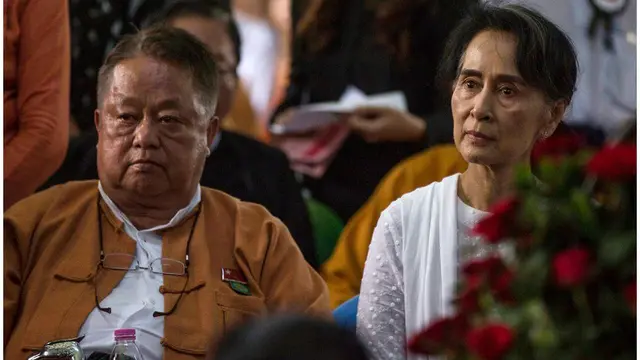Myanmar's military is tightening its crackdown on the former civilian government, with the arrest of a senior leader from Aung San Suu Kyi's National League for Democracy (NLD) party.
Win Htein was taken from his Yangon home early on Friday. He told the BBC he was arrested under sedition laws.
Ms Suu Kyi and other leaders have been detained since the military launched its coup on Monday, plunging the South East Asian country into uncertainty.
Their whereabouts remain unknown.
The military overthrew Ms Suu Kyi's government after it claimed a November election won by the NLD was fraudulent, though the country's election commission said there was no evidence to back up these allegations.
The move has been met with global outrage.
In his latest statement, US President Joe Biden on Thursday called on the military to"relinquish power" and release detained officials and activists.
The US had already threatened severe sanctions on Myanmar, which is also known as Burma.
However, the military is seemingly undeterred by the disapproval, continuing down its path of consolidating power and appointing new ministers in the capital Naypyitaw, said the BBC's South East Asia correspondent Jonathan Head.
In a pre-dawn phone call with BBC Burmese, Win Htein said he was being taken to the capital by members of the police and the military.
He said he was being detained under sedition laws - which carry a maximum punishment of life imprisonment - although he was not told the exact charge.
"They don't like what I've been talking about. They are afraid of what I'm saying," he said.
The 79-year-old patron of the NLD and strong supporter of Ms Suu Kyi has given several interviews since the coup criticising the military and its leader Min Aung Hlaing.
Earlier this week he told local news magazine Frontier that the Tatmadaw, or Myanmar's armed forces, would "go into disrepute because of the coup".
"Staging a coup at the moment shows they are not wise and narrow minded," he said. "I experienced the coup of General Ne Win in 1962... Myanmar's economy suffered for 26 years after his coup."
Myanmar has remained mostly calm in the aftermath of the coup.
However, about 70 MPs are holding an insurgent parliament, to replicate the parliamentary session that was supposed to take place this week.
A civil disobedience movement is also gaining momentum.
Residents in some cities including Yangon have conducted nightly protests from their homes, where they have been banging pots and pans and singing revolutionary songs.
Some healthcare workers, teachers and civil servants have either organised small protests or gone on strike, while others have continued to work wearing symbols of defiance such as a red ribbon.
A small street protest took place in front of a university in Myanmar's second city, Mandalay on Thursday, with reports of four arrests.
Many have also turned online to protest the coup. The military has since temporarily banned Facebook, which is widely used across the country.
Since the ban began on Thursday, many Burmese citizens have appeared to have flocked to other social media platforms like Twitter and Instagram.
Twitter declined comment when asked by the BBC if it had seen a spike in new users or tweets from Myanmar.
On Thursday US President Joe Biden said they would work with partners to "support restoration of democracy and the rule of law, and impose consequences on those responsible".
"The Burmese military should relinquish power they have seized, release the advocates and activists and officials they have detained, lift the restrictions on telecommunications, and refrain from violence," he said.
Mr Biden had earlier warned that the US was considering re-imposing sanctions.
The United Nations Security Council also released a statement on Thursday stressing "the need to uphold democratic institutions and processes, refrain from violence, and fully respect human rights, fundamental freedoms and the rule of law."
The UN has not condemned the coup outright, but in doing so it has brought China and Russia behind a call for the release of Aung San Suu Kyi and her colleagues, in what our correspondent has described as a rare show of international unity.
(BBC)
 简体中文
简体中文

